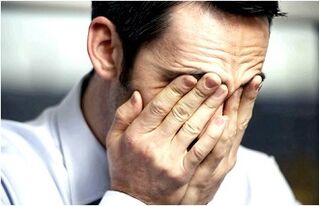
Prostatitis is an extremely unpleasant disease.
Given how important it is for every man to feel leadership and superiority in everything, problems in sexual life can have a very negative impact on mental health, self-confidence and the desire to gain in general. Therefore, it is very important to recognize, treat and improve the disease with prostatitis in a timely manner. In men, drug treatment of prostatitis is most effective, but it does not always help. In addition, it is important for any man, without exception, aged 30-35 years, because then he falls into the risk group for this disease. At the same time, the disease can manifest itself in different forms, have different manifestations, and therefore it is very important to regularly consult a doctor for prevention.
But first you need to understand exactly what this disease is. For this it is necessary to apply knowledge of medicine and anatomy. The word "prostatitis" is of Latin origin - prostatitis. In the true sense of the word, the prostate (derived from the word) is a prostate gland and itis is inflammation. That is, prostatitis occurs as a result of an infection in the prostate. This happens very often because the gland is in a place where bacteria can easily penetrate through the intestines, bladder, blood or lymph. And this happens quite often, but in most cases, the man's body successfully copes with it. Additional factors are required for the formation of prostatitis.
Causes of prostatitis
The causes of this disease can be different, there are many factors and nuances that cause inflammation of the prostate. However, there is a root cause of this disease. These are pathogenic microbes that penetrate the prostate, become active, erode and destroy tissues from the inside, and thus cause an inflammatory process.
At the same time, depending on the nature of the disease and the form in which it takes place, inflammation can occur in different ways. In some cases, it develops rapidly and is accompanied by severe pain, and sometimes the infection gradually destroys the tissues, the disease begins to progress, and the infection can continue even if it is eliminated.
The infection itself enters the prostate gland along the ascending pathway. Most often - in the urinary tract, especially in diseases of the genitourinary system. In some cases, from the infected pelvic organs through the blood and lymph. Thus, the prostate gland is infected.
There are several factors that can affect the onset of inflammation:
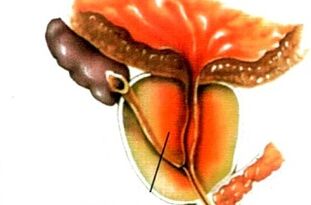
- Infectious diseases of the genitourinary system.
- Sexually transmitted diseases and sexually transmitted infections.
- Excessive hypothermia, especially in winter.
- Decreased body's ability to defend itself when the immune system is unable to cope with the infection.
- Obstruction and significant impairment of the circulatory system in the small pelvis, mainly during sedentary work and lack of necessary physical activity.
- Irregular sex life and prolonged abstinence (due to natural massage of the prostate gland during ejaculation).
- Excessive sex also often causes inflammation of the prostate gland.
- Injury to the genitals or perineum. Motorcyclists and cyclists, as well as drivers, are more susceptible to such injuries.
- Alcohol and smoking abuse. Such bad habits cause serious problems with the body as a whole and cause edema, especially in the prostate gland.
- An unbalanced and harmful diet can also cause prostatitis, because the immune system is compromised due to vitamin and mineral deficiencies.
- Psychological and physical overload that causes stress in the body.
- Allergic reactions.
- Hormonal system disorders.
- Fecal problems (regular and frequent constipation).
However, the above factors do not mean that if a man is a driver who likes to ski in the winter or an office worker who spends the whole working day in a sedentary position, of course, there is inflammation of the prostate gland. This means that only such risk factors should be routinely examined to help determine the onset of the inflammatory process. It is recommended to do this at least once every six months, as prevention will be cheaper and safer than full and long-term treatment.
types of prostatitis
Doctors diagnose various forms of prostatitis.
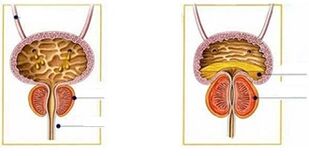
- Chronic bacterialis a chronic inflammation of the prostate, usually a long-lasting bacterial infection. This form of prostatitis is diagnosed when appropriate bacteria are found in a sample of prostate secretion.
- Chronic abacterial prostatitis- chronic inflammation of the prostate, non-infectious, ie the test does not detect bacteria. The development of this type of prostatitis is mainly due to autoimmune damage to the prostate tissue.
- Acute prostatitisis a special form characterized by chronic pain. They are mainly localized in the genitals. These pains are the main and main symptom of prostatitis.
- Asymptomaticis the most unpleasant form of the disease, which is difficult to diagnose and continues without symptoms. It can be detected only by regular preventive examinations.
symptoms
The first and most obvious symptom of inflammation of the prostate gland is difficulty urinating and painful sensations. If you have such feelings, you should definitely consult a doctor and check for an infection. Similarly, if urination occurs too often and the bladder empties into small pieces.
Given that often inflammatory processes begin to be completely asymptomatic and gradually turn into a chronic form, it is important to pay attention to any changes and unusual sensations in the body. And the treatment of such a disease is very difficult, because even after the infection is eliminated, the development of prostatitis can continue.
Acute prostatitis is very easy to diagnose. Because in this situation it manifests itself sharply and suddenly. However, it should be remembered that each man's disease can continue in completely different ways, everything is very individual.
Symptoms of acute prostatitis, the main symptoms of prostatitis:

- Painful urination.
- Frequent urge to empty the bladder.
- Painful sensations in the perineal region. And not only in the genitals, but also in the anus and sacrum.
- Potential disorders.
- If the najis act is accompanied by painful sensations.
- Weakened body and feels bad.
- Temperature rise.
- Increased, unexplained sweating.
- Constantly full bladder feeling.
- During bowel movements, there is a discharge along the urethra.
- Unstable emotional state, nervousness.
It is not necessary for a man to show all the symptoms at once, because each organism is individual. Therefore, the manifestations may be completely different. One of the most pressing symptoms to check for an inflammatory process is a power outage. This can be either an erection problem or premature ejaculation, and in some cases, a lack of sexual desire in principle. But do not worry - the underlying disease will not be cured, all these problems will disappear by themselves.
Diagnostics
You should consult a urologist to make a correct diagnosis and determine the presence of the disease. If you can't do it alone and start the inflammatory process, you can cause serious complications.
The approximate algorithm used for diagnostics is as follows:
- An examination by a doctor who makes a general clinical assessment of the condition.
- Urine analysis (usually a general analysis for microflora).
- Examination for sexually transmitted diseases.
- Determining if there is an infection using a swab from the urethra.
- discharge analysis.
- Ultrasound examination of pelvic organs.
- Urography.
- In some cases, a biopsy if prostate cancer is suspected.
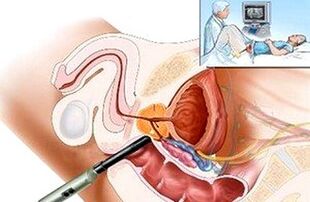
After performing all of the above studies, if inflammation is detected, a "trial" treatment of the infection is performed. And already on the basis of all this information, the doctor develops another treatment regimen for prostatitis.
Often the question arises as to whether chronic prostatitis can be treated. The doctors' comments on this issue are very comforting, the treatment is very convenient.
Treatment
The disease itself is very difficult and causes great difficulties for doctors in treatment. However, this does not mean that the doctor can not do anything. The disease is completely cured and you can help the patient by eliminating the symptoms. Using a medication for prostatitis in men, you can get rid of the anxiety very quickly. In addition, modern medicine is capable of many things, including creating a stable remission. The truth is that the whole treatment depends on the patient. It is necessary to clearly and unequivocally follow all the recommendations prescribed by the doctor, because otherwise you will not get the desired result. However, it is very important to be sure of the doctor's professionalism in order to provide a treatment, because the process itself, the treatment regimen for prostatitis must be very competently designed, otherwise it will be difficult to achieve effectiveness.
A number of measures to treat prostatitis usually include the following procedures:
Antibiotic treatment
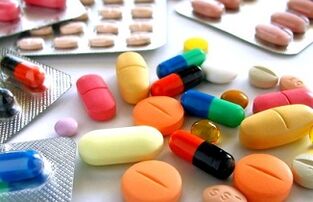
Since prostatitis is an inflammation caused by an infection of the prostate, the main treatment is to suppress it. For this reason, prostatitis is treated with antibiotics. It is difficult to distinguish the best treatment for prostatitis, because everything is completely individual. Today, doctors use macrolide drugs to treat chronic prostatitis. The main effect is to block the formation of protein in bacteria, thereby disrupting their ability to function. Despite the use of other drugs in some cases. The attending physician selects the drug and prepares a treatment regimen with its help, taking into account individual characteristics, so the drug itself and the dose will not be the same in each case.
On average, the duration of taking antibiotics is about 2 weeks. Again, everything depends on the individual characteristics of each patient. After this period, a second complete examination and examination is performed to determine whether treatment should be discontinued or the regimen changed. Prostatitis medication for men is one of the main ways to fight prostatitis. But not alone.
Massage
Massage is a very effective tool for both prevention and treatment of prostatitis. Since one of the main reasons for this is stagnation, massage allows you to eliminate them. By improving blood microcirculation and drainage of prostate secretions in the genitals, there is a general improvement in the condition, and the treatment is much more successful, recovery is faster. Prostate massage can be performed both independently and with a doctor. Methods include microclysters, testicular massage, direct effect from the anus to the prostate. But there are some limitations. Since such a massage has a certain physical effect, it is not recommended to do it if the prostatitis continues in an acute form, as well as with hemorrhoids, cracks and other diseases of the rectum. Massage is often prescribed in addition to antibiotic therapy, as it has repeatedly proven effective in treating this difficult disease. Massage treatment of prostatitis is often included in a number of measures to get rid of this unpleasant disease.
Treatment of prostatitis at home, in addition to massage, involves the implementation of a complex or individual gymnastic exercises that will help to normalize blood circulation in the pelvic organs and thus improve speed.
Physiotherapy
In addition, physiotherapy procedures are prescribed to treat prostatitis, which can effectively combat the disease. Helps improve tissue trophism & blood circulation in prostateFor these procedures, one or another device is used to treat prostatitis. Methods and measures of physiotherapy include magnetic and laser therapy, electrophoresis, hot baths, diadynamophoresis and ultrasound phonophoresis. In some cases, the use of mud baths is very effective. Another physiotherapeutic procedure for the treatment of prostatitis is the use of enemas of different composition. For example, to use mineral water.
Remember to be very careful to avoid any harm when using each individual prostatitis machine.
Herbal medicine
It is generally used in addition to the main course of treatment. Prostatitis in men is treated at home with the help of phytotherapy, but in no case should it replace the main antibiotic. Taking herbal mixtures and dietary supplements helps to strengthen the body's immune system, thereby increasing the body's defenses and helping it to fight infection successfully. Chronic prostatitis is treated with folk remedies with the help of herbal medicine. This type of therapy is a good addition to the main treatment, because due to the effect of certain herbs it is possible to accelerate blood circulation to the pelvic organs and the body as a whole and increase resistance to infection.
Psychotherapy
Prostatitis is often psychosomatic. And it turns out that the use of pills for prostatitis does not work to achieve the desired effect. In addition, prostatitis often causes serious problems in the sexual sphere of a man's life, which often leads him to an unstable psycho-emotional state. Psychotherapy aims to cope with these moments of crisis and remain a full-fledged person. Men often become extremely insecure from such health problems, which affect all areas of life. It is very important to combine prostatitis treatment with adult psychological work with the patient. It is often the case that a person is more effective after undergoing a course of psychotherapy and overcoming a number of very difficult internal problems. Therefore, this type of therapy is no less important than others for a successful treatment.
Surgery
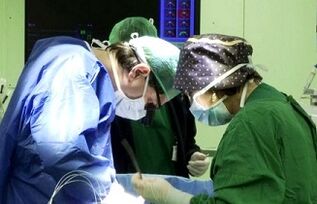
Especially in difficult and advanced cases, the help of a surgeon may be needed. Narrowing of the urethra and prostate abscess may occur. Sometimes it is necessary to cut the adenoma. All this happens if the diagnosis and proper treatment are not carried out in time. Then complications begin - and such intervention is no longer required. In severe cases, surgery may be required to remove the prostate. To prevent such consequences, it is necessary to take regular preventive measures and consult a doctor every six months.
Immunoreception
Since inflammation is caused by the body's inability to fight infection on its own, the immune system needs to be strengthened to effectively treat prostate inflammation. In addition, if an antibiotic treatment has previously been unsuccessful, the immune system is weakened and further strengthening is needed. In addition, such therapy has a very positive effect on the prevention of recurrence of prostatitis after treatment.
Treatment can be just a vitamin or mineral supplement. The best method is to contact an immunologist who will perform all the necessary tests and diagnose the body's deficiencies in order to increase successful work and protective functions. Then drugs for the treatment of prostatitis will be the most effective.
Nutrition
In addition to general therapy, especially if chronic prostatitis is treated, certain adjustments are made in the regimen and diet. At the same time, there are no general schemes; in each case, its own restrictions or additions apply. It depends on both the form of the disease and the man's own body.

But there are some basic requirements that are mandatory. In addition, it is advisable to monitor them as soon as prostatitis is suspected. These restrictions include, first and foremost, abstinence from alcohol. Because it has a destructive effect on the body and can lead to the development of inflammation. Therefore, you should limit the use of salt in your daily diet. To ensure daily fluid intake in the body - at least 1. 5 liters.
In any case, the diet should be based on fresh vegetables and fruits, and the rest of the products are already added to them. If a complication occurs, it is advisable to refrain from fried foods and steam everything. Protein foods - meat, fish and chicken - are also desirable to eliminate during the period of exacerbation of inflammation, gradually returning as the condition improves.
There are also a number of products that can adversely affect the prostate, and for this reason, it is recommended that they at least significantly reduce their use for the duration of treatment, if not excluded. These products include:
- Tea and coffee - thanks to the high amount of caffeine. Sometimes cocoa is included in this group.
- Any canned food, smoked meat, salting and excessive spicy or spicy dishes should also be excluded.
- Any animal fat, including broths.
- Cabbage and all legumes can cause intestinal fermentation and should be avoided.
- Bread products, especially wheat flour - for the same reason.
The doctor will additionally explain to you what needs to be changed in the diet.
Alternative Treatment
Prostatitis can also be treated with folk remedies, which are very effective. But at the same time it is important to consult a doctor in advance and start such treatment only with his consent. There are many folk recipes - it can be either the use of individual products, for example, propolis or pumpkin seeds, or to create special products, tinctures, candles.
Folk remedies for prostatitis can be a very effective adjunct to your prostatitis medication. But under no circumstances should you treat yourself.
Prevention

The main preventive measure of any disease is to pay attention to your health. To prevent prostatitis, you should simply try to avoid the factors that can cause it. That is, stay cool, follow your diet and lifestyle, get regular physical activity, and prevent sexually transmitted infections. Also, have regular sex with a partner, treat any infection immediately, especially the pelvic organs.
However, the best preventive measure is to see a doctor regularly. Because prostatitis is often completely asymptomatic and will not be diagnosed in time, it will be more difficult to treat in the future. Therefore, you should not forget this measure and consult a doctor at least once every six months.
























